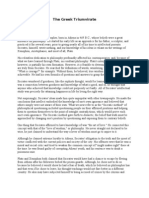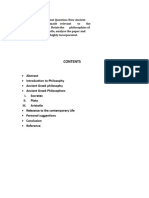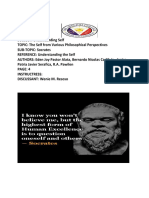0 ratings0% found this document useful (0 votes)
2K viewsSocrates
Socrates
Uploaded by
Mary Joy BernasolSocrates was an influential ancient Greek philosopher known for establishing the Socratic method of questioning beliefs and exposing contradictions. He did not leave any written works, so our knowledge comes from his students Plato and Xenophon. Socrates believed that pursuing knowledge and wisdom through reasoned debate was important for individual well-being and society. He was sentenced to death for corrupting youth, but faced his death calmly and is seen as a martyr for philosophy.
Copyright:
© All Rights Reserved
Available Formats
Download as PPTX, PDF, TXT or read online from Scribd
Socrates
Socrates
Uploaded by
Mary Joy Bernasol0 ratings0% found this document useful (0 votes)
2K views10 pagesSocrates was an influential ancient Greek philosopher known for establishing the Socratic method of questioning beliefs and exposing contradictions. He did not leave any written works, so our knowledge comes from his students Plato and Xenophon. Socrates believed that pursuing knowledge and wisdom through reasoned debate was important for individual well-being and society. He was sentenced to death for corrupting youth, but faced his death calmly and is seen as a martyr for philosophy.
Copyright
© © All Rights Reserved
Available Formats
PPTX, PDF, TXT or read online from Scribd
Share this document
Did you find this document useful?
Is this content inappropriate?
Socrates was an influential ancient Greek philosopher known for establishing the Socratic method of questioning beliefs and exposing contradictions. He did not leave any written works, so our knowledge comes from his students Plato and Xenophon. Socrates believed that pursuing knowledge and wisdom through reasoned debate was important for individual well-being and society. He was sentenced to death for corrupting youth, but faced his death calmly and is seen as a martyr for philosophy.
Copyright:
© All Rights Reserved
Available Formats
Download as PPTX, PDF, TXT or read online from Scribd
Download as pptx, pdf, or txt
0 ratings0% found this document useful (0 votes)
2K views10 pagesSocrates
Socrates
Uploaded by
Mary Joy BernasolSocrates was an influential ancient Greek philosopher known for establishing the Socratic method of questioning beliefs and exposing contradictions. He did not leave any written works, so our knowledge comes from his students Plato and Xenophon. Socrates believed that pursuing knowledge and wisdom through reasoned debate was important for individual well-being and society. He was sentenced to death for corrupting youth, but faced his death calmly and is seen as a martyr for philosophy.
Copyright:
© All Rights Reserved
Available Formats
Download as PPTX, PDF, TXT or read online from Scribd
Download as pptx, pdf, or txt
You are on page 1of 10
Socrates was a classical Greek philosopher who is
credited with western philosophy. He is known for
creating socratic irony and the socratic method
(elenchus). He has had profound influence on
western philosophy, along with his student plato
and Aristotle.
He was born c. 470 BCE, Athens. Died 399 BCE. A
greek philosopher whose way of life, character, and
thought exerted a profound influence on ancient
and modern philosophy.
SOCRATIC METHOD
Socrates was one of the most important philosophers
of ancient Greece. He focused on epistemology, in
contrast to pre-socratic thinkers who has focused on
metaphysics. He didn’t leave any written teachings
behind, so our knowledge of his philosophy is
mediated by the works of his students, Xenophon and
plato.
Philosophy. Socrates believed that philosophy
achieved practical results for the greater well-being of
society. He attempted to establish an ethical system
based on human reason rather than theological
doctrine. Socrates pointed out that human choice is
motivated by the desire for happiness.
The socratic method also known as method of
Elenchus, elenctic method or socratic debate, is a
form of cooperative argumentative dialogue between
individuals, based on asking and answering questions
to stimulate critical thinking and to draw out ideas and
underlying presuppositions.
In this story, Socrates has been convicted of
corrupting the youth of Athens and introducing
strange gods, and has been sentenced to die by
drinking poison hemlock. Socrates uses his death as a
final lesson for his pupils rather than fleeing when the
opportunity arises, and faces it calmy.
Socrates and theory of knowledge. At the trial,
Socrates says, “the only true wisdom consists in
knowing that you know nothing.” Socrates put
emphasis on knowledge all his life because he
believed that “ the ability to distinguish between right
and wrong lies in people’s reason not in society.
Legacy. Socrates is seen by some people as martyr,
since he is willingly died to support the idea that
knowledge and wisdom are very important to our lives.
Socrates, known as one of the most important
philosophers in history. He is often described as the
father of western philosophy.
Legacy. Socrates is seen by some people as martyr,
since he is willingly died to support the idea that
knowledge and wisdom are very important to our lives.
Socrates, known as one of the most important
philosophers in history. He is often described as the
father of western philosophy.
Perhaps his most important contribution to western
thought is his dialectic method of inquiry, known as
socratic method. Which he largely applied to the
examination of key moral concepts such as the good
and justice.
“ I know that I know nothing” is a saying derived from
plato’s account of the greek philosopher Socrates. It is
also called the socratic paradox. The phrase is not one
that Socrates himself is ever recorded as saying.
“ the unexamined life is not woth living” is a famous
dictum apparently uttered by Socrates at his trial for
impiety and corrupting youth, for which he was
subsequently sentenced to death.
Socrates professed not to teach anything and indeed
not to know anything important but only to seek
answers to urgent human questions.
“ what is virtue and what is justice?” and to help others
to do the same. His style of philosophizing was to engage
in public conversations about some human excellence
and through skillful questioning, to show that his
interlocutors did not know what they were talking about.
Despite the negative results of these encounters,
Socrates did hold some broad positive views, including
that virtue is a form of knowledge and that “ care of the
soul” ( the cultivation is the most important human
obligation.
He wrote nothing. All that is known about him has been
inferred from accounts by members of his circle
primarily plato and Xenophon as well as by plato’s
student Aristotle who acquired his knowledge of
Socrates through his teacher. The most vivid portraits
of Socrates exist in plato’s dialogues, in most which
the principal speaker is “ Socrates.”
You might also like
- Communication Survey Questions - 1Document2 pagesCommunication Survey Questions - 1Mary Joy Bernasol80% (5)
- The Big Three of Greek PhilosophyDocument3 pagesThe Big Three of Greek PhilosophyGenmar Morgia Frayna100% (1)
- Asato Ma Sad GamayaDocument2 pagesAsato Ma Sad GamayaAnonymous AMmNGgPNo ratings yet
- God Created YouDocument232 pagesGod Created YouYayra De SouzaNo ratings yet
- Philosophy Report DoneDocument16 pagesPhilosophy Report Doneomar floresNo ratings yet
- Bio OF SocratesDocument2 pagesBio OF SocratesGdisipuloNo ratings yet
- SocratesDocument2 pagesSocratesRizzalyn OrtizNo ratings yet
- Socrates Story of LifeDocument8 pagesSocrates Story of LifeShane Loryll RosalejosNo ratings yet
- "The Only True Wisdom Is in Knowing You Know Nothing." "There Is Only One Good, Knowledge, and One Evil, Ignorance."-SocratesDocument5 pages"The Only True Wisdom Is in Knowing You Know Nothing." "There Is Only One Good, Knowledge, and One Evil, Ignorance."-SocratesJean SalvadorNo ratings yet
- Greek Philosophers A ReviewDocument16 pagesGreek Philosophers A ReviewChristina ValenciaNo ratings yet
- Name of The Philosopher: Socrates Origin:: Classical Greek Athenian PhilosopherDocument6 pagesName of The Philosopher: Socrates Origin:: Classical Greek Athenian PhilosopherPonnusamy ManivelNo ratings yet
- Western Dialectic Justice: SocratesDocument3 pagesWestern Dialectic Justice: SocratesTeona TurashviliNo ratings yet
- Classical PhilosophyDocument2 pagesClassical PhilosophyAngela AlejandroNo ratings yet
- SocratesDocument22 pagesSocratesdhelNo ratings yet
- A Biography of SocratesDocument2 pagesA Biography of SocratesOroncasNo ratings yet
- PHILOSOPHY AND-WPS OfficeDocument6 pagesPHILOSOPHY AND-WPS OfficeCj TabianNo ratings yet
- SOCRATES Biography Part 1Document7 pagesSOCRATES Biography Part 1justine joi WrightNo ratings yet
- The Greek TriumvirateDocument5 pagesThe Greek TriumvirateGene50% (4)
- Filsafat Masa Socrates: Sejarah Dan Diskursus Pemikiran: AbstrakDocument6 pagesFilsafat Masa Socrates: Sejarah Dan Diskursus Pemikiran: AbstrakSarahNo ratings yet
- Socrates, (Born C. 470Document3 pagesSocrates, (Born C. 470Chioma IhenachoNo ratings yet
- Philosophy and The Examined LifeDocument3 pagesPhilosophy and The Examined LifeCtorres910No ratings yet
- SocratesDocument8 pagesSocratesLakshman SinghNo ratings yet
- Baetiong, Ayana Mae - Manuel. Khrystyn - Pahilagao, Dan - Palacio, Angela - Pascual, Raymond Socrates BiographyDocument17 pagesBaetiong, Ayana Mae - Manuel. Khrystyn - Pahilagao, Dan - Palacio, Angela - Pascual, Raymond Socrates BiographyRaymond A. PascualNo ratings yet
- OR134108Document8 pagesOR134108Vaibhav JoshiNo ratings yet
- Top 12 Contributions of SocratesDocument9 pagesTop 12 Contributions of Socrateslucela gambongNo ratings yet
- Pre Socratic PeriodDocument20 pagesPre Socratic PeriodMohdNo ratings yet
- ReportingDocument3 pagesReportingJake Cormanes PeraltaNo ratings yet
- Written Report Grp1 Socsci Final. CNDocument9 pagesWritten Report Grp1 Socsci Final. CNJc LoremiaNo ratings yet
- ENG FinalDocument10 pagesENG Finalkillerinnight12No ratings yet
- Greece - Sophists & SocratesDocument31 pagesGreece - Sophists & SocratesElRulosNo ratings yet
- SócratesDocument9 pagesSócratesFatima HernandezNo ratings yet
- SocratesDocument17 pagesSocratesEtsegent TeshomeNo ratings yet
- Socrates (C. 469 - 399 B.C.) Was A Hugely Important Greek Philosopher From TheDocument5 pagesSocrates (C. 469 - 399 B.C.) Was A Hugely Important Greek Philosopher From TheAnna Marie SantosNo ratings yet
- Socrates BiographyDocument10 pagesSocrates BiographyBlanca Lucía Hernández FletscherNo ratings yet
- Socrates BiographyDocument2 pagesSocrates BiographyBobi Gintoki100% (1)
- Russo Socrates1Document4 pagesRusso Socrates1Henry Ft HersuNo ratings yet
- SocratesDocument3 pagesSocratesJoshua DownsNo ratings yet
- Socrates Thesis IdeasDocument6 pagesSocrates Thesis Ideasaflnzraiaaetew100% (2)
- Political Philosophy The Greek PhilosophersDocument10 pagesPolitical Philosophy The Greek PhilosophersLatif ubed narejoNo ratings yet
- Socrat SeDocument4 pagesSocrat Se史朗EzequielNo ratings yet
- The Western PhilosophersDocument2 pagesThe Western PhilosophersOrromiyya FamiliaNo ratings yet
- Module 2Document9 pagesModule 2jfailog143No ratings yet
- Socrates - Quotes Collection: Biography, Achievements And Life LessonsFrom EverandSocrates - Quotes Collection: Biography, Achievements And Life LessonsNo ratings yet
- Socrates As A Great Thinker and A PedagogueDocument12 pagesSocrates As A Great Thinker and A Pedagoguejoykirt100% (1)
- Greek Philosophy PhilosophyDocument8 pagesGreek Philosophy PhilosophyJaffar ZubairNo ratings yet
- 10 1 Socrates PlatoDocument26 pages10 1 Socrates PlatoABHI PIMNo ratings yet
- Socrates FinalDocument8 pagesSocrates Finalapi-265745081No ratings yet
- SocratesDocument10 pagesSocratesReymart Inot AbionNo ratings yet
- Socrates-Reporting RubianoDocument11 pagesSocrates-Reporting RubianoZACKIENo ratings yet
- PlatoDocument27 pagesPlatoTalha GondalNo ratings yet
- Socrates: SynopsisDocument3 pagesSocrates: Synopsisjan kienethNo ratings yet
- The Complete Aristotle Collection: Nicomachean Ethics, Politics, Metaphysics, Poetics, Rhetoric, On Sense and the Sensible, and All His Other WorksFrom EverandThe Complete Aristotle Collection: Nicomachean Ethics, Politics, Metaphysics, Poetics, Rhetoric, On Sense and the Sensible, and All His Other WorksNo ratings yet
- SocratesDocument10 pagesSocratesIsla VermilionNo ratings yet
- Personal and Developmental Perspective of Self and Identity: The Self From Various Philosophical PerspectivesDocument23 pagesPersonal and Developmental Perspective of Self and Identity: The Self From Various Philosophical PerspectivesAyana Mae BaetiongNo ratings yet
- Socrates of GreeceDocument1 pageSocrates of Greecetechhspace25No ratings yet
- Understanding SelfDocument6 pagesUnderstanding SelfWenie Malong ResosoNo ratings yet
- Philosophy and LogicDocument20 pagesPhilosophy and LogicJeffrey MendozaNo ratings yet
- PlatoDocument7 pagesPlatoAlyParasNo ratings yet
- HUM Chapter 31Document26 pagesHUM Chapter 31KayceeAlcantaraNo ratings yet
- 01 Teaching Materials 2Document2 pages01 Teaching Materials 2Leonardo C. SilvestreNo ratings yet
- SocratesDocument5 pagesSocratesgagerNo ratings yet
- Philosophers G 11 SlidesManiaDocument55 pagesPhilosophers G 11 SlidesManialyssafate sabandoNo ratings yet
- Cristobal - Divine Grace - M - Bsed 3aDocument2 pagesCristobal - Divine Grace - M - Bsed 3aMary Joy BernasolNo ratings yet
- Azure Festival Program of ActivitiesDocument4 pagesAzure Festival Program of ActivitiesMary Joy BernasolNo ratings yet
- QUESTIONS Reporter No. 5Document4 pagesQUESTIONS Reporter No. 5Mary Joy BernasolNo ratings yet
- Criteria Percentage (%)Document2 pagesCriteria Percentage (%)Mary Joy BernasolNo ratings yet
- Final DemoDocument8 pagesFinal DemoMary Joy BernasolNo ratings yet
- Math 6 Summative 1Document4 pagesMath 6 Summative 1Mary Joy BernasolNo ratings yet
- Math 6 Summative 2Document3 pagesMath 6 Summative 2Mary Joy BernasolNo ratings yet
- Welcome To English 116Document1 pageWelcome To English 116Mary Joy BernasolNo ratings yet
- Promoting Pedagogical Excellence: Midterm ExaminationDocument3 pagesPromoting Pedagogical Excellence: Midterm ExaminationMary Joy BernasolNo ratings yet
- Self IntroductionDocument1 pageSelf IntroductionMary Joy BernasolNo ratings yet
- Diffun Campus: "Molding Minds, Shaping Future"Document41 pagesDiffun Campus: "Molding Minds, Shaping Future"Mary Joy BernasolNo ratings yet
- Module 2 MOdern Physics FinalDocument8 pagesModule 2 MOdern Physics FinalMary Joy BernasolNo ratings yet
- Introducing Myself - Gangan - Marleonyrose G.Document1 pageIntroducing Myself - Gangan - Marleonyrose G.Mary Joy BernasolNo ratings yet
- Module 1 MOdern Physics FinalDocument10 pagesModule 1 MOdern Physics FinalMary Joy BernasolNo ratings yet
- Diffun Campus: "Molding Minds, Shaping Future"Document17 pagesDiffun Campus: "Molding Minds, Shaping Future"Mary Joy BernasolNo ratings yet
- Cause Effect: Name: - ScoreDocument1 pageCause Effect: Name: - ScoreMary Joy BernasolNo ratings yet
- The Power of Hand Washing To Prevent Coronavirus: PCSMTDocument2 pagesThe Power of Hand Washing To Prevent Coronavirus: PCSMTMary Joy BernasolNo ratings yet
- Diffun Campus: "Molding Minds, Shaping Future"Document11 pagesDiffun Campus: "Molding Minds, Shaping Future"Mary Joy BernasolNo ratings yet
- Diffun Campus: "Molding Minds, Shaping Future"Document7 pagesDiffun Campus: "Molding Minds, Shaping Future"Mary Joy BernasolNo ratings yet
- Science PDFDocument3 pagesScience PDFMary Joy BernasolNo ratings yet
- Element of Short StoryDocument13 pagesElement of Short StoryMary Joy BernasolNo ratings yet
- Competencies: Diffun CampusDocument20 pagesCompetencies: Diffun CampusMary Joy BernasolNo ratings yet
- MendozaDocument17 pagesMendozaMary Joy Bernasol100% (1)
- (Argument Structure of VerbsDocument17 pages(Argument Structure of VerbsMary Joy Bernasol100% (2)
- Cognitive Theory: Presented By: Silahis, Diana Rose Princess DDocument47 pagesCognitive Theory: Presented By: Silahis, Diana Rose Princess DMary Joy BernasolNo ratings yet
- Computer Ethics, Privacy and Security: Vilchor G. PerdidoDocument38 pagesComputer Ethics, Privacy and Security: Vilchor G. PerdidoMary Joy BernasolNo ratings yet
- Teaching Techniques GROUP REPORTDocument17 pagesTeaching Techniques GROUP REPORTMary Joy BernasolNo ratings yet
- Template Kalender 2024 Tema Hello KityDocument1 pageTemplate Kalender 2024 Tema Hello KityMasmun GpNo ratings yet
- Card 1 Comparative Analysis of Political Attiudes of University and Madrssa StudentsDocument2 pagesCard 1 Comparative Analysis of Political Attiudes of University and Madrssa StudentsAhmadNo ratings yet
- King of Kings - SongSelect Chart in DDocument2 pagesKing of Kings - SongSelect Chart in Develyn gonzalezNo ratings yet
- 07 Akbar HyderDocument28 pages07 Akbar HyderCandra SuryaNo ratings yet
- SHRMP Volunteer DevotionsDocument43 pagesSHRMP Volunteer DevotionsErin WeldonNo ratings yet
- Unit 12 PDFDocument44 pagesUnit 12 PDFswagod pooloNo ratings yet
- Remembering The Saints: Wami RishnanandaDocument4 pagesRemembering The Saints: Wami RishnanandaVasu KodagantiNo ratings yet
- Book ND AuthorsDocument6 pagesBook ND AuthorsPavan ShahNo ratings yet
- The Book of LifeDocument2 pagesThe Book of LifeAnna Mae M. TorresNo ratings yet
- Reset - Values, Mindset, & Character 2022 - FinalDocument38 pagesReset - Values, Mindset, & Character 2022 - FinalKOFI BROWNNo ratings yet
- Cultural Sensitive DietDocument15 pagesCultural Sensitive DietLumos Maxima100% (1)
- vol.42 14변창욱Document20 pagesvol.42 14변창욱Thabiso EdwardNo ratings yet
- Like FatherDocument4 pagesLike FatherJamaica BilanoNo ratings yet
- Prometheus ScriptDocument161 pagesPrometheus ScriptNathan Holzsterl100% (5)
- Socio-Cultural Study of Village Deities in Peraiyur Taluk of Madurai District With Special Reference To Hero StonesDocument4 pagesSocio-Cultural Study of Village Deities in Peraiyur Taluk of Madurai District With Special Reference To Hero StonesNoah AbrahamNo ratings yet
- History WorksheetDocument2 pagesHistory WorksheettalhaNo ratings yet
- Self AcceptanceDocument42 pagesSelf AcceptanceHaitian Man100% (2)
- 5.how Do I Love TheeDocument5 pages5.how Do I Love TheeFuad Mahmud Abir GUBNo ratings yet
- Turn It Up Chords by Planetshakers: A B C#M B/D# E A E A E A E ADocument3 pagesTurn It Up Chords by Planetshakers: A B C#M B/D# E A E A E A E ADiane Bonilla LacenaNo ratings yet
- Oath of Office: Mariano Marcos Memorial High SchoolDocument2 pagesOath of Office: Mariano Marcos Memorial High SchoolMarkie EspañolaNo ratings yet
- The Future of Interfaith Dialogue Muslim-Christian Encounters Through A Common Word by Yazid Said, Lejla Demiri-46-63Document18 pagesThe Future of Interfaith Dialogue Muslim-Christian Encounters Through A Common Word by Yazid Said, Lejla Demiri-46-63lightmoonnn0No ratings yet
- History Speaks - Ahmedabad Walled CityDocument12 pagesHistory Speaks - Ahmedabad Walled CityDivya RathNo ratings yet
- Pidato Bahasa InggrisDocument3 pagesPidato Bahasa InggrisMarta SaputraNo ratings yet
- Aiming For World Peace Is Utopia (AutoRecovered)Document1 pageAiming For World Peace Is Utopia (AutoRecovered)Rakshit VermaNo ratings yet
- Fresco of BacchusDocument1 pageFresco of BacchusЛазар СрећковићNo ratings yet
- Burn - Tina ArenaDocument1 pageBurn - Tina ArenaPaul MaligadNo ratings yet
- Sannyasa Initiation Lecture - TranscriptionDocument3 pagesSannyasa Initiation Lecture - TranscriptionGauravNo ratings yet
- The Boy We ServeDocument10 pagesThe Boy We ServeAILEEN GALIDO100% (1)





















































































































